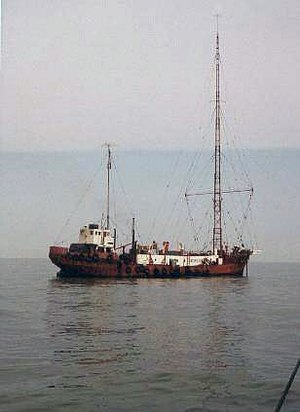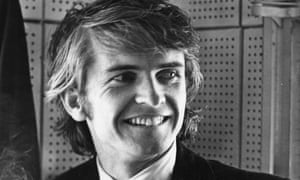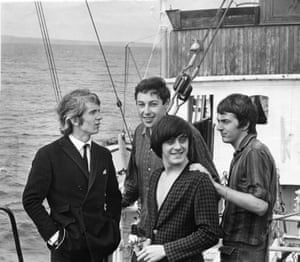
Ronan O’Rahilly, Radio Caroline founder who inspired UK pop and pirate radio, dies aged 79
Ronan O’Rahilly, the Irish founder of the notorious Radio Caroline that popularised pop music on British radio, has died aged 79.

His death was announced by the radio station that is still broadcasting, who said: “In a pastime populated by unusual people, Ronan was more unusual than all of them combined.” He had been diagnosed with vascular dementia in 2013.
O’Rahilly first became known as a player in the burgeoning “swinging London” scene of the 1960s, managing Alexis Korner (the blues-rocker who nurtured the career of the Rolling Stones) and Georgie Fame. Fame eventually had three UK No 1 singles, but O’Rahilly initially struggled to get his musicians noticed by BBC stations and the then-popular Radio Luxembourg, and so founded his own station, Radio Caroline, in 1964.
He circumvented licensing laws by acquiring a former Danish passenger ferry, anchoring it in the North Sea off Felixstowe, and broadcasting from there. With a much less diverse radio industry than today and the BBC only playing two hours of pop music a week, Radio Caroline quickly amassed a listenership of millions for its daytime pop-focused output.
Many DJs would become household names and enjoy successful post-Caroline careers, including Tony Blackburn, Johnnie Walker, Dave Lee Travis and Simon Dee. Walker paid tribute, calling him an “amazing man … who made the impossible possible and changed radio for ever”.
In 1967, an act of parliament outlawed offshore radio stations on the grounds that they were not paying royalties to artists, and that their broadcasts could interfere with emergency channels. A number of Radio Caroline’s DJs moved to the newly created Radio 1, which had been influenced by the success of the former and another offshore station, Radio London. Radio Caroline then moved to Dutch waters, and continued broadcasting at sea until 1991.
O’Rahilly used Radio Caroline to promote his own philosophy of “loving awareness”, which espoused peace and love over hate, and even set up a band, Loving Awareness, to further the cause.
He also continued his management career, including representing James Bond actor George Lazenby. Lazenby paid tribute to O’Rahilly on Instagram, saying “rest well, Ronan”.

Lazenby shared “bittersweet” reminiscences about how O’Rahilly convinced him not to take a contract for multiple Bond movies, with the franchise passing to Roger Moore. “He was very influential on me giving up the role of James Bond back in 1969,” Lazenby wrote. “Ronan convinced me Bond was all over … I’d be in danger of becoming part of the Establishment. Something he rebelled against. Easy Rider was supposed to be the way forward and I could do three or four of those type of movies for every Bond. I wanted to be a free spirit, make love, not war. Ronan wouldn’t let me sign the Bond contract – kept sending it back … Who knows what would have happened had Ronan not got a hold of my brain? But I don’t regret a day of my life.”
O’Rahilly also produced Lazenby’s film Universal Soldier, as well as the Alain Delon and Marianne Faithfull film The Girl on a Motorcycle. The Radio Caroline story became the basis for the 2009 Richard Curtis film The Boat That Rocked, starring Philip Seymour Hoffman.
Original Article – THE GUARDIAN 21st April 2020

